By Imara Jones
Workers who earn minimum wage at retailers open on Thanksgiving Day can thank fallout from the government shutdown for being on the job that day. A record number of retailers will allow consumers to spend during an unprecedented number of hours on America’s most storied holiday this year. Though this trend of “Black Friday Creep” is not new, it is reaching new heights and being driven by errant decisions in Washington.
To be fair, since the 2008 recession, Thanksgiving has been slowly transforming into a shopping day that marks the start of the holiday retail season. But the collapse in consumer confidence after the shuttering of the government in October and the rollback in government food assistance just weeks ago, has unnerved retailers and pushed them to extend hours to unseen limits. That’s because without a successful holiday season the retail business simply doesn’t make economic sense.
According to the Retail Federation of America, sales between Thanksgiving Day and Christmas Eve account for up to 40 percent of a store’s annual sales. Those four weeks is when consumer businesses swing into profit. They essentially underwrite operations for the previous 11 months.
The lack of a gangbusters holiday season translates into serious trouble for retailers.
In fact, Black Friday—the historic beginning to the most important shopping season of the year—is called such because it was once the beginning of the time when retailers moved from yearly losses, or “red,” into making money, or “black.” Spurred by an economy that cratered six years ago, “Black Friday” has given way to Thanksgiving Day as the start of it all.
This year retailers are so worried about holiday sales that, according to The Wall Street Journal, they cranked up holiday marketing campaigns earlier than last year, starting before Halloween. By the end of October they’d reached 35 percent more consumers with store ads and gifts than the same period of time last October.
Why the panic?
Before the government shutdown retailers were poised to have a strong 2013 holiday season. Forecasts put sales 4 percent higher than last year—twice the growth rate of the economy—and consumers were set to spend $786 on gifts this year. But the 17-day government shutdown changed all that.
During the D.C. showdown two million federal workers—disproportionately people of color—and the families that depend on them were denied vital pay at a critical point in the pre-holiday season. The government shutdown ultimately sucked $25 billion out of the economy.
The consequence of this economic earthquake is that it pushed consumer confidence in the month of October to lows not not seen in two years.
Adding to the worry of consumers and retailers is the fact that on Nov. 1, SNAP food assistance—which helps one out of five working poor recipients with food costs—was slashed. This move took an additional $5 billion from the pockets of potential holiday shoppers and removed $8.5 billon in overall economic benefit right before the start of the crucial shopping season.
It’s no surprise then that between the shutdown and the rollback in SNAP, Americans slashed their holiday budgets by 10 percent, telling Gallup this month that they plan to spend $704 on gifts instead of the $786 that stores and chains had been counting on.
Responding to the reversal of consumer sentiment and budgets, retailers decided to open their stores earlier than ever with the hope of enticing more shoppers to spend. They announced the change during the same week in November when disappointing consumer confidence data were released and when SNAP benefits were cut.
The problem is that extended hours may not be enough for retailers to hit their profit numbers. With real wages at a 40-year low and the actual value of the current minimum wage lower than in 1968, the reality of workers’ earning power might just be catching up to holiday sales.
“I think until the issues are resolved that are making news these days, we’re not going to see a very large rebound in the middle of the economy and in consumer confidence,” Walmart U.S. CEO Bill Simon told The New York Times.
But whether this holiday season will ultimately surprise everyone is unknown at this point. According to business channel CNBC, “factors such as the growth in online shopping, rising home values, a stock market that continues to reach new highs and gas prices at their lowest holiday levels in four years” could lead to an unexpected turnaround.
This might be true, but regardless of how the holiday season turns out, tens of millions of struggling workers will have to report to work this Thursday in order to ensure that companies meet their financial targets, which were jeopardized by actions in Washington. The rough beginning to the holiday season for retail workers is yet another casualty of the ongoing Budget War in the nation’s capital.















